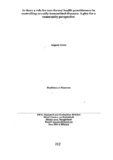| dc.contributor.author | Hashima-e-Nasreen | |
| dc.date.accessioned | 2019-11-18T08:30:00Z | |
| dc.date.available | 2019-11-18T08:30:00Z | |
| dc.date.issued | 2000-08 | |
| dc.identifier.citation | Nasreen, H. E. (2000, August). Is there a role for non-formal health practitioners in controlling sexually transmitted diseases: a plea for a community perspective. Research Reports (2000): Health Studies, Vol - XXIX, 312–330. | en_US |
| dc.identifier.uri | http://hdl.handle.net/10361/13001 | |
| dc.description.abstract | In a country like Bangladesh, where sexual health problems other than HIV/AIDS are more
apparent and immediate, and when most women are impoverished and illiterate, a broad genderbased
approach to sexual health is needed. Given the importance of non-formal sector in rural
health care for the poor, it is expected that sexual health services would be improved when
traditional healers and other existing practices become integrated rationally into the system. This
paper describes the existing practices of the non-formal practitioners in managing STD patients
and also, the possibility of their participation in public health interventions to improve STD
management and services. Study findings revealed that rural people, when infected with a STD
often seek help from pharmacists or village doctors, traditional healers and community health
workers. They do not feel free to go to the formal health sector due in part to the social
stigmatization of the discussion of sexuality and sexual health related problems. The too often
high cost of treatment and the low quality of clinic counseling also discourage people from going
to STD clinics. Therefore, a community based RTI/STD control and prevention programme is
needed which will bring the networks of the non-formal health sectors together with the formal
health sectors. Study findings also revealed that neither the non-formal nor the formal health
providers were able to give adequate information about control and prevention of STDs.
Programmes should be innovative in the planning and designing of materials and training
curriculum for the non-formal health practitioners. Because of the high level of illiteracy, picture
stories would be the most appropriate means to mirror the social context of risk and vulnerability
and to encourage active participation of the target community. With regards to some of their
high-risk treatments, both healers and patients will have to be taught about the dangers so that
they can easily avoid them and make appropriate referrals, if needed. It is encouraging to note
that the non-formal health providers in Matlab expressed their interest in becoming sexual health
educators if they receive appropriate training and incentives. | en_US |
| dc.language.iso | en | en_US |
| dc.publisher | BRAC Research and Evaluation Division (RED) | en_US |
| dc.subject | Non-formal health practitioners | en_US |
| dc.subject | STD | en_US |
| dc.subject | HIV/AIDS | en_US |
| dc.subject | Health | en_US |
| dc.subject.lcsh | Sexually transmitted diseases | |
| dc.subject.lcsh | AIDS (Disease) | |
| dc.subject.lcsh | HIV infections | |
| dc.title | Is there a role for non-formal health practitioners in controlling sexually transmitted diseases: a plea for a community perspective | en_US |
| dc.type | Research report | en_US |

